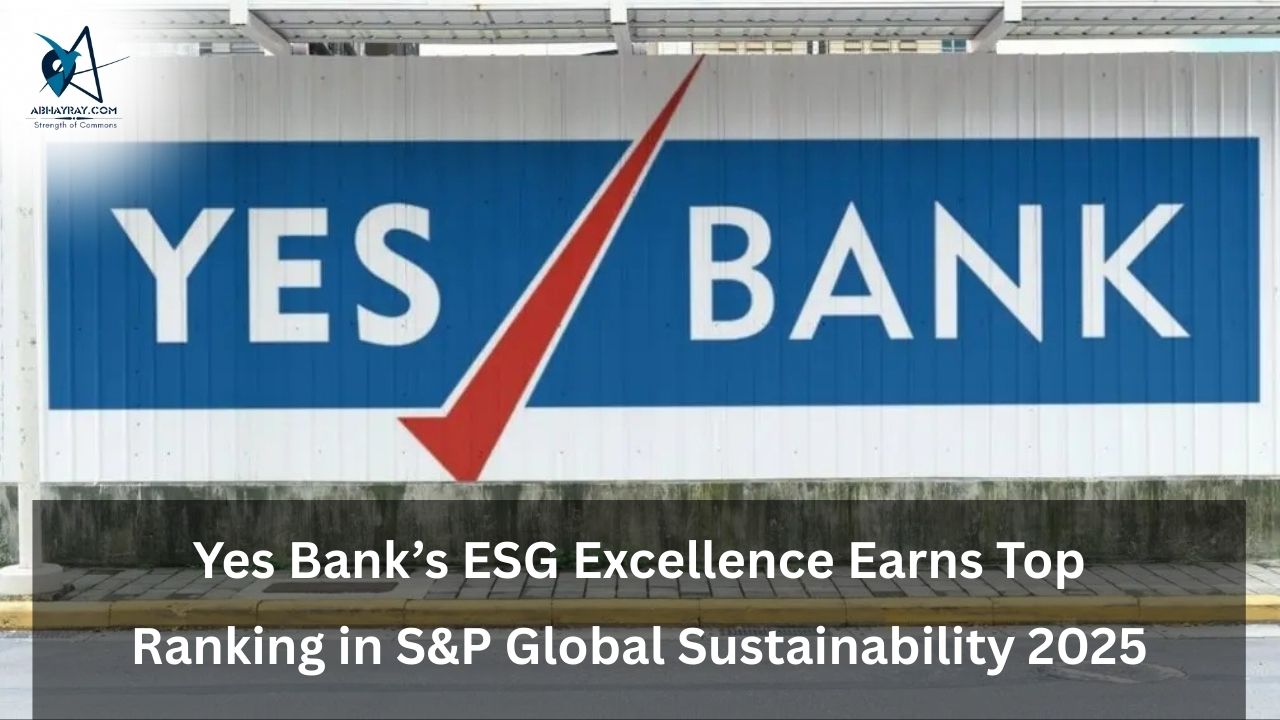Introduction
Yes Bank has once again emerged as India’s highest-rated bank in sustainability, marking its third consecutive year at the forefront of environmental, social, and governance (ESG) excellence. This recognition comes from the 2024 S&P Global Corporate Sustainability Assessment (CSA) and the Carbon Disclosure Project (CDP), further establishing the bank as a leader in the financial sector when it comes to sustainable business practices. Yes Bank’s commitment to sustainability is underscored by its impressive performance in key ESG ratings, making it the only Indian bank to be featured in the prestigious S&P Global Sustainability Yearbook 2025. The Yearbook includes the top 15% of global leaders in sustainability, reaffirming Yes Bank’s position as a beacon of responsible banking.
S&P Global Recognition
Yes Bank’s strong performance in sustainability is evident through its CSA score of 72/100, which places it at the highest position among Indian banks. This score reflects the bank’s commitment to critical ESG factors, including climate strategy, operational eco-efficiency, human capital development, and corporate governance. With this score, Yes Bank stands as a model for other Indian companies in terms of integrating ESG practices into their business models.
The S&P Global Sustainability Yearbook 2025 recognizes only 780 organizations from over 7,690 companies assessed globally. Among these, Yes Bank is the only Indian bank to earn this prestigious distinction, highlighting its role as an ESG leader in the global financial ecosystem. The CSA evaluation covered up to 1,000 data points, assessing various ESG factors such as climate strategy, financial inclusion, human rights, and risk management. Yes Bank’s strong standing in these areas confirms its status as a responsible corporate entity with a long-term vision for sustainability.
Yes Bank’s Environmental, Social, and Governance (ESG) practices have been a key driver behind the bank’s continuous growth and recognition. These initiatives are carefully overseen by a Board-level CSR and ESG Committee, ensuring that sustainability is at the core of the bank’s decision-making processes.
Leadership in Climate Change and CDP Recognition
The Carbon Disclosure Project (CDP) also recognized Yes Bank for its outstanding climate risk management and disclosure practices. The bank retained its A- rating in the Leadership Band, which is awarded to organizations that demonstrate excellent practices in managing and reporting climate risks. In the 2024 CDP assessment, over 22,000 organizations were evaluated based on 17 key parameters, including governance, strategy, risk management, and targets. Yes Bank excelled in 11 of these parameters, further solidifying its position as a global leader in climate change mitigation.
Yes Bank’s climate risk management strategy is an essential aspect of its overall sustainability efforts. As part of its ongoing commitment to reducing its environmental footprint, the bank has set an ambitious target of achieving net-zero emissions for Scope 1 and Scope 2 by 2030. This goal aligns with international decarbonization benchmarks, ensuring that Yes Bank plays a significant role in reducing global greenhouse gas emissions. The bank has also become the first Indian bank to disclose financed emissions for its electricity generation loans, aligning its targets with the global goal of limiting warming to well below 2°C.
Key Sustainability Initiatives and ESG Distinctions
Yes Bank’s sustainability achievements are not limited to its strong ratings in global assessments. The bank continues to make significant strides in various other ESG initiatives that have a positive social and environmental impact.
- One of the key highlights of Yes Bank’s sustainability journey is its commitment to achieving net-zero operations by 2030. The bank has set a clear roadmap for reducing its Scope 1 and Scope 2 emissions, which primarily involve direct and indirect emissions from its own operations. This ambitious target will significantly reduce the bank’s carbon footprint and contribute to global efforts to combat climate change.
- In addition to its operational sustainability goals, Yes Bank has also taken steps to enhance financial inclusion, particularly for women in rural India. Through its flagship group-lending program, YES LEAP, the bank has empowered over 6.56 lakh active women customers in rural areas, providing them with access to financial resources and opportunities for economic growth. This initiative highlights the bank’s commitment to creating social value and fostering inclusivity in India’s underserved communities.
- Yes Bank’s sustainability efforts have earned recognition from multiple global platforms. The bank has been included in the FTSE4Good Index Series for the second consecutive year in 2024, a notable achievement that underscores its commitment to corporate social responsibility. Furthermore, the bank has maintained its ISS ESG ‘Prime’ status, remaining the only Indian bank with this rating, which reflects its superior sustainability performance compared to its peers.
Robust Governance and Future Outlook
At the heart of Yes Bank’s sustainability strategy is a strong governance framework. The Board-level CSR and ESG Committee provides comprehensive oversight of the bank’s sustainability initiatives, ensuring that ESG considerations are fully integrated into the bank’s operations and long-term strategy. This robust governance structure ensures that Yes Bank remains accountable to its stakeholders and maintains the highest standards of transparency and responsibility.
As Yes Bank continues to make progress in its ESG journey, the bank is resolute in its commitment to building resilience against ESG risks and capitalizing on opportunities in sustainable finance. Niranjan Banodkar, Group CFO of Yes Bank, emphasized the bank’s dedication to integrating ESG values into daily operations and building a resilient, equitable future. With strong governance, ambitious sustainability goals, and an unwavering focus on social responsibility, Yes Bank is well-positioned to remain a leader in sustainability within the Indian banking sector and beyond.
Conclusion
Yes Bank’s continued recognition in sustainability, through top-tier ratings from S&P Global and CDP, is a testament to its unwavering commitment to responsible banking practices. With a comprehensive ESG strategy, net-zero targets, and initiatives aimed at financial inclusion and climate change mitigation, Yes Bank has firmly established itself as a global leader in sustainability. The bank’s success serves as a model for other financial institutions, showcasing how integrating ESG values can drive both positive social impact and long-term financial success.
GMICapitals.com RaysVeda.com GetMyStartup.com LawCanal.com GetMyIndia.com ZinCob.com Angeltors.com

